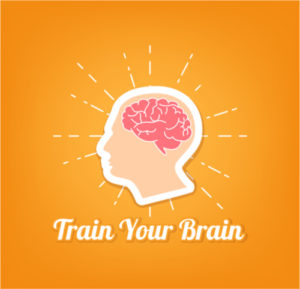Well, that’s good to hear. One of my old supervisors called it “graduate student disease”. As soon as we would cover a disorder in class or practicum, suddenly everyone in my cohort agreed that they had it. We spend so much time dwelling on psychopathology that it is next to impossible not to see some of the characteristics reflected in ourselves.
Thankfully, none of us actually had any major psychopathologies (aside from some anxiety, but who doesn’t in graduate school, right?). I’m sure that you all, my loyal readers, are also (for the most part) alright. Which brings us to our topic for this week. There is no such thing as a normal brain [1]. In fact, psychology shows us that there is not really any such thing as a “normal person” either [2].
To illustrate this point, we can go back to an example of the 1920s United States Air Force. Todd Rose details a specific instance in the Air Force at the genesis of jet-powered planes [3]. The government agency hired several research assistants to take the measurements of many pilots in order to find the mean measurements of them all [3]. The cockpits of the planes would then be fitted to the “average pilot” [3]. As the reader has probably anticipated, this did not turn out to be the best method. Even with the extreme accuracy and breadth of data collected, there were still a staggering number of “pilot errors” and complaints of not fitting within the cockpit [3].
It wasn’t until the 1940s that finally a Lieutenant decided to compare the measurements of each of the Air Force’s pilots to the arithmetic mean “individual” that they had created from all the data points [3]. Surely the average would at least account for a decent proportion of those individuals, right? [3]. What Lieutenant Daniels found was that there was not even one individual who fit into the “average” measurements that were taken [3]. That’s right, ZERO [3].
It’s easy to brush this off as a fluke. However, our field seems to back this up. Holmes and Patrick [4] agreed that variability is not only normal, but it is necessary. They explained that there is a larger issue with our society that encourages the population to push toward some artificial, imagined average [4]. They encourage variations in our culture and in our population [4]. It is important as an adaptive and evolutionary function [4].
In the past, our society essentially needed averages so that we could attempt to address the majority of the population or “do the most good”. However, in our extremely progressive world, science has allowed to tailor everything to the individual. Rose and Ogas describe this as a “science of the individual” [2]. They explain that there is enough knowledge to conform the systems of nutrition, genetics, medicine, neuroscience, biology, and even psychology to the individual [2].
However, how do we know a psychopathology then? Surely each difference being necessary in an evolutionary standpoint cannot stand up when faced with the idea of disordered behavior [1]. Avram Holmes [4] argues that there simply cannot be a single phenotype alone that is worth diagnosing a psychological disorder. Behavior develops and is maintained as it serves some sort of function for the individual [5]. This means that the behavior alone is not implicitly “good” or “bad” [1].
Holmes [4] described studying a myriad of phenotypes simultaneously to understand whether or not a person should be diagnosed with something that is clinically relevant. With this in mind, biomarkers are then much more difficult to see as adequate predictors of psychological illnesses [4]. He explains that that there a single biomarker would never be enough to cause a psychological illness. In order to better predict this, he notes that a broader approach should be taken [1].
This is good news for those of us suffering from “graduate school disease”. When we see single variations in ourselves that could lend itself to a disorder, that is never enough to be able to diagnose a psychopathology or disordered behavior [1].
This is also good news for our clients. As budding clinicians, we are required to take into consideration the entire picture of the client—to tailor our field to fit more with the model of “the science of the individual” [2]. There is no singular line that we can draw between a “healthy” or “normal” brain compared to a “pathologized” or “disordered” one, let alone person [1].
References
- Cell Press (2018, February 20). When it Comes to Our Brains, There’s No Such Thing as Normal. NeuroscienceNews. Retrieved February 20, 2018 from http://neurosciencenews.com/brain-normal-8527/
- Rose, T., & Ogas, O. (2018). There Is No Average Person. Here’s Why.. Psychology Today. Retrieved 19 April 2018, from https://www.psychologytoday.com/us/blog/the-science-the-individual/201601/there-is-no-average-person-heres-why
- Rose, T. (2016). The end of average: How to succeed in a world that values sameness. Penguin UK.
- Holmes, A. J., & Patrick, L. M. (2018). The myth of optimality in clinical neuroscience. Trends in cognitive sciences.
- Cooper, J. O., Heron, T. E., & Heward, W. L. (2007). Applied behavior analysis.





